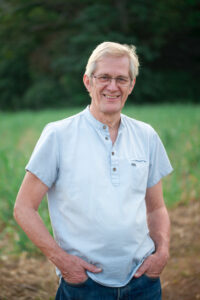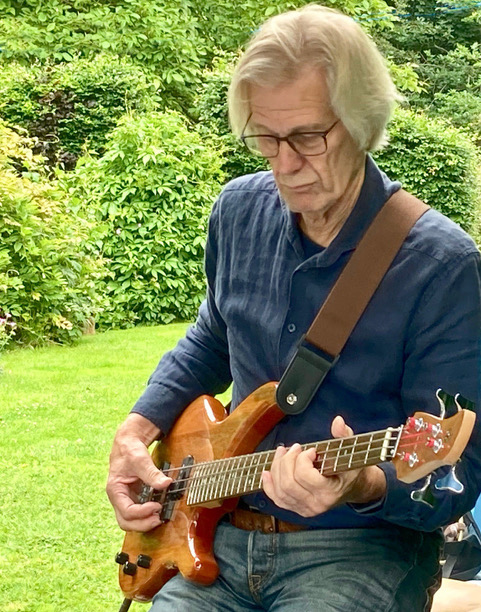After you’re done reading we’d love for you to leave a comment at the bottom of the page, like this post on Facebook, or retweet it on Twitter. It really helps more people discover our work!
Mike is nearly seventy. Since ceasing full time work nearly ten years ago, Mike Smith has pursued a ‘later life’ career providing expert advice, training and coaching in the areas of research, innovation, and commercialisation. He currently serves as Chair or Non-Executive Director on the Boards of several organisations and companies and is also a Trustee of the Wigtown Book Festival.
His later life career builds on his expertise acquired over the years as a research scientist working in the NHS, the University sector, and with commercial companies. He trained as a physicist but has mostly worked in the medical and health sector and has been a Professor of Medical Physics and then Medical Science for over thirty years. For the last ten years of his full-time career, he was Deputy and Pro Vice Chancellor in the University sector, broadening his experience and expertise into other sectors.
He has played music throughout his life but did not start learning the instruments he plays in bands until later in life. He started playing saxophone when he was in his mid-forties and didn’t start playing bass until just before the start of lockdown.
Correspondence about later life careers (ProfMASmith@gmail.com) or playing music (mike.smith@jammingcodgers.com) would be welcome.
During an early morning trawl through new emails in my various accounts, I was intrigued to find an interesting and unusual request. I’m quite used to emails asking me to write pieces or give presentations on subjects about which I have some expertise or hopefully an interesting perspective, but this email asked me to write a short piece on how I personally approach the subject of relaxation, something I have always assumed I just don’t do. Partly this is my own perspective, but also because I am continually berated by friends and family for doing too much, travelling hither and thither, and giving every appearance to others of never relaxing. So I was just about to press the send key of a polite ‘I think you’ve sent this to the wrong person’ response, when I paused and thought perhaps I should accept the challenge and give it a go.
I should start by saying that I think I have been privileged to have had a ‘working life’ which gave me both continued enjoyment and a sense of satisfaction in what I do. In addition, I had opportunities to see many parts of the world and meet a range of very interesting and often delightful people. As a consequence, I have never really felt the need to actively seek relaxation, as a way of ‘switching off’ from my working life’s, or indeed my home life’s, activities. Also, I ceased full-time employment when I was sixty, with the view to pursuing a ‘later-life’ career which would enable me to build on my previous professional life and expertise and explore opportunities to move into new areas of science and innovation whilst enabling me to jettison most of the tiresome baggage which builds up after decades of working in very large organisations and with government departments. This means that, at this stage in my life, my predominantly desk-based professional and pro-bono work provides me with remarkably effective relaxation from the physical activities in my life, which become increasingly challenging as I get older. When my professional work requires me to travel to places like India, Kazakhstan, or China, I’m now able to extend the trip sufficiently to factor in any relaxation I may need to recover from the travel.
Outside in the cold sunshine, cocooned in multiple thermal layers, I’m able to immerse myself in garden maintenance
I relax mentally by spending time gardening. To anyone else, my gardening activity looks to be the opposite of relaxation. I’ll spend half a day weeding, digging, lopping and cutting, engaged in what – to all intents and purposes – appears to be hard labour. I have always been of the view that complete physical and mental relaxation in the garden can only be achieved by having at least two gardeners and an inability to distinguish weeds from plants. My gardening does, however, get close to complete relaxation in the winter months. Outside in the cold sunshine, cocooned in multiple thermal layers, I’m able to immerse myself in garden maintenance, knowing that the garden won’t fight back; anything cut stays cut until spring, and doesn’t grow again as soon as my back’s turned. And to further enhance this mental relaxation whilst gardening, there is the additional pleasure of listening to long unabridged audiobooks on headphones, whilst sitting weeding.
But even when I’m engaged in physical activity to relax mentally, or mental activity to relax physically, that eternal to-do list, and the tyranny of cyber-communication, still looms in my peripheral awareness. And this is where music comes in – the activity that distracts and relaxes me from life’s to-do list, and which has become more important with age. I’ve always enjoyed listening to music but it’s the performance of music that has now become my focus.
I should stress that I do not regard myself as a good musician. But, with practice, rehearsal and playing with the right people in a band, the total can be much greater than the sum of the parts, and I feel my level of playing is lifted higher when playing with others. I currently play in two bands, each playing completely different styles of music. One is a ten piece which plays R&B, soul, Motown and vintage pop, in which I play tenor and alto saxophone. The other is a five piece playing folk and roots oriented music, in which I play electric bass, guitar and penny whistle. In addition to individual practice and joint rehearsals, I also have to write my arrangements, which for me is quite a time consuming but a completely absorbing activity. Lastly I have to get performance fit, because my musical activities are physically very demanding. The instruments I play are quite heavy (and seemingly get heavier each year), and standing playing for two hours, concentrating on playing all the right notes in all the right order, is both physically and mentally challenging.
This is hard enough for a rehearsal but when it is a gig, it’s at a different level. It’s late on a Saturday night and I’m backstage, dressed in my performance clothes, thinking that it’s way past my normal bedtime. Everyone is psyched up and reminding each other to switch on their wireless headsets. At the appropriate signal I make my way onto the darkened stage to my instruments and microphones and hear the quiet hum of the full PA system and sense the crowd in the darkened room. The spotlights come on and I feel the wall of heat from the lamps as we are illuminated. Silence for five seconds and then one . . . two . . . one two three four . . . and the music blasts out and I feel the adrenalin surge and the mojo working its magic.
Then time speeds up and suddenly the last encore has ended, we’ve taken our bows, and we’re backstage. I quickly pack my instruments away, aware that my clothes are sweat-soaked from the heat on stage the energy of the performance. I load my gear into the car and drive home in the early morning along empty roads, feeling the adrenalin slowly ebbing away. And when I’m home, how do I then relax? I lie down and sleep before my eyes even close.






